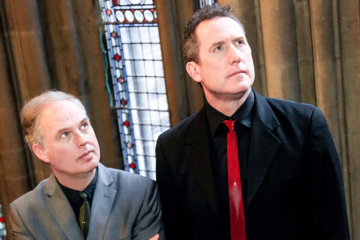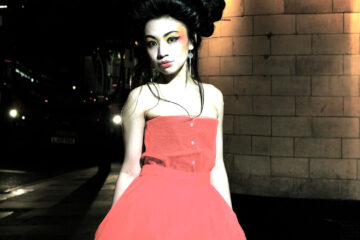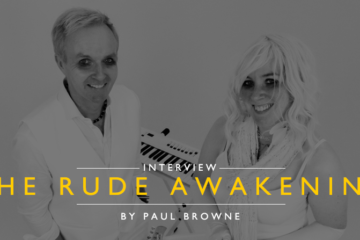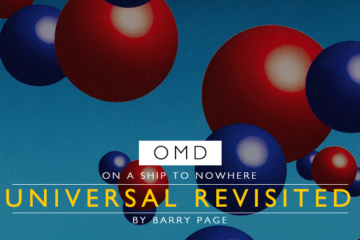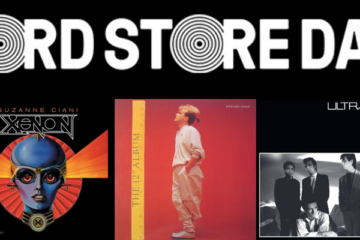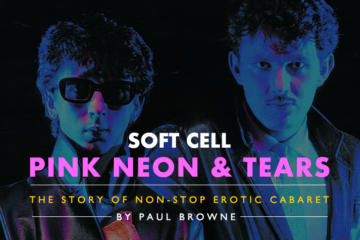
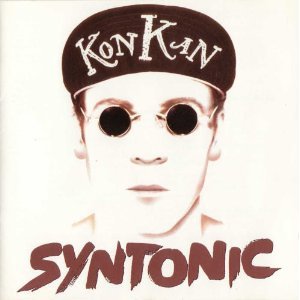 In 1989 Canadian act Kon Kan scored a huge international hit with “I Beg Your Pardon”, an innovative composite of synth-pop influences (New Order and Pet Shop Boys in particular) and samples (notably, country star Lynn Anderson’s ‘Rose Garden’). Whilst the duo’s follow-up singles and parent album, Move to Move, didn’t fare as well, Atlantic Records were impressed enough to bankroll a second album.
In 1989 Canadian act Kon Kan scored a huge international hit with “I Beg Your Pardon”, an innovative composite of synth-pop influences (New Order and Pet Shop Boys in particular) and samples (notably, country star Lynn Anderson’s ‘Rose Garden’). Whilst the duo’s follow-up singles and parent album, Move to Move, didn’t fare as well, Atlantic Records were impressed enough to bankroll a second album.
Buoyed by enthusiastic live audiences the previous year, and newly invigorated by his Juno Award for ‘I Beg Your Pardon’, Barry Harris decided to record the follow-up on his own; thus ending his creative association with singer Kevin Wynne. This wasn’t a great surprise, since it had originally been Harris’s intention to utilise Kon Kan as a solo vehicle. Singing in a slightly deeper register to Wynne, he had already proven himself an effective vocalist, singing the lead on two of Move to Move’s tracks (‘Am I In Love’ plus the title track). With the aid of executive producer Marc Nathan, who had brought Kon Kan to the attention of Atlantic Records, an ensemble of talented musicians and producers were assembled to cut the record at various transatlantic locations.
Syntonic, whilst retaining much of its predecessor’s influences and sample-laden ideas, was less hurried and indeed a more focused and assured collection of songs (many of these were co-written by Bob Mitchell, who had been retained after the Move to Move sessions). I asked Barry how much creative control he had on the new opus:-
Barry Harris: “I had quite a bit of creative control but this time felt more like 50/50 with the record company. I felt like I had to produce a Top 40 hit. It was a totally different experience, but quite fun as well. I learned a lot from different producers, this time working in New York and London – a very exciting time.”
One of the key producers on Syntonic was John Luongo, who was a legendary figure from the disco era, remixing tracks by the likes of The Jacksons, Dan Hartman and KC and the Sunshine Band. In synth circles, Luongo is known both as a producer (Blancmange) and a remixer (Visage and Cabaret Voltaire). I asked Barry and Marc how the prolific producer and remixer got involved on Syntonic:-
Barry Harris: “Marc Nathan hooked us up. At first I wasn’t totally aware of who John Luongo was, and I certainly should have! He was a great guy, and we had a great time working together. I learned a *lot* from him too!”
Marc Nathan: “John Luongo was a well respected dance music producer who I had met a few times, and certainly admired – his resume speaks for itself. And, while we were acquaintances up to the point of the making of Syntonic, I am pleased to say that over 20 years later we are actually good friends, and I have nothing but great memories of his working with us on that project.”
The first single to be released from the album was the Luongo-produced ‘Liberty’, the first of many co-writes with jobbing songwriter Bob Mitchell. Boasting a strong lead vocal (with terrific support by jobbing session singer Debbe Cole) and a veritable smorgasbord of choral presets, Latino and Italo-house influences, this brilliant pop song set the standard for the rest of the album.
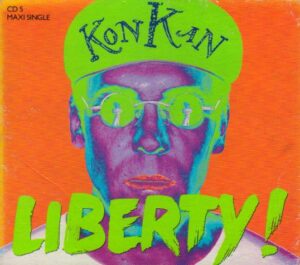
Almost a statement of intent about his solo aspirations, the single’s sleeve featured a striking, bold image of Harris wearing a Kon Kan hat (a promotional gimmick that had been in circulation since the ‘Puss N’ Boots’ video), ‘Liberty’ was released in November 1990 but was sadly not a hit. It was certainly a low-key UK single, heralding virtually no press attention upon its release (this writer only discovered the single by accident at a record fair!).
Another notable Luongo production was the excellent second single, ‘(Could’ve Said) I Told You So’ which was closer in format to ‘I Beg Your Pardon’ than its predecessor, and perhaps should have been considered as the album’s lead-off single. It cleverly contrasted the humorous chorus of Jimmy Soul’s US number 1 hit from 1963, ‘If You Wanna Be Happy’, with a bittersweet lyric. The female lead vocal was this time supplied by Luongo’s wife, Joy Winter, who had cut a record (‘Frantic Romantic’) that year with both Luongo and legendary Freestyle producer, Lewis Martineé at the helm. Session vocalist Gordon Grody helped to recreate Jimmy Soul’s memorable chorus (interestingly, he would later become a vocal coach for Lady Gaga). An undoubted highlight of the album (barring the saxophonic blemishes!), Harris is less enthused with the results these days:-
Barry Harris: “‘If You Wanna Be Happy’ was Marc Nathan’s idea, to write a new song around that chorus. I was up for the challenge at the time and this is what I came up with. In hindsight I’m not really happy with it (no pun intended). I feel I made something way too pop and feel that I totally lost my way with this one – I wasn’t true to myself at all. I’d say it’s one of my weaker creations. Oh well…c’est la vie!”
Marc Nathan: “It’s funny that it was apparently ‘my idea’. I’m not sure exactly how that happened, but I do know I was a huge fan of Kid Creole and the Coconuts, and they had done a rather lackluster cover of that song, and I knew it was certainly a memorable tune, so yes, I guess I suggested it to Barry and he came up with ‘(Could’ve Said) I Told You So’.”
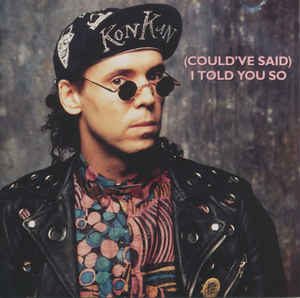
Another highlight was ‘Time’ (again, produced by Luongo), which was similar in format to ‘(Could’ve Said) I Told You So’, with a synth motif that was once again comparable to Spagna’s ‘Call Me’. Interposed – and equally effectively – this time was a track by Juno Award-winning Canadian rock band Trooper called ‘We’re Here For A Good Time (Not A Long Time)’ which perfectly complemented the reflective verses.
Arguably, the centrepiece of the album (and not just because it was sequenced in the middle of the album) was an excellent 6-minute plus version of ‘Victim’, which had originally been cut by Candi Staton in 1978. The song’s composer was Dave Crawford, who had also penned both Linda Lyndell’s ‘Whatta Man’ (later popularised by both Salt-n-Pepa and En Vogue) and Staton’s massive hit ‘Young Hearts Run Free’ (a drug-dependant Crawford, forced to sell his songs on the cheap for quick cash, fell on hard times in the 1980s and died in tragic circumstances). The Kon Kan version of ‘Victim’ (a duet with compatriot Carole Pope), replete with various samples, whistles and hip-hop breaks (the ubiquitous ‘Amen break’), had other interesting origins, as Barry Harris recalls:
Barry Harris: “This was an idea of Marc Nathan’s for me to produce a duet between alternative Canadian rocker, Carole Pope, and Tim Curry. I went to LA the day after we won the Canadian Juno in [the] spring of ’90 and started recording with Carole and Tim (they already knew each other). It turned out the record company didn’t care for Tim’s voice, which surprised me because I thought it was fine – it was Tim Curry sounding like Tim Curry. But we shelved the whole idea and I continued writing new Kon Kan songs. Towards the end of the making of Syntonic later that summer I suggested why don’t I just sing it instead of Tim and salvage the production (which I still liked) and have John Luongo mix it and make it a Kon Kan record… which is what we did!”
Also on board for the production of the album were both Martyn Phillips (who had produced The Beloved’s Happiness album that year, and would later helm Erasure’s excellent Chorus album) and Paul Robb, a member of Minnesota band, Information Society. Up until this point INSOC’s career had been running almost parallel to Kon Kan’s, with both bands having recently enjoyed huge hit singles on the Billboard chart (in INSOC’s case it was ‘What’s On Your Mind (Pure Energy)’ which contained various Star Trek samples). Both acts were crafting Freestyle-infused synth-pop, so Robb’s involvement on Syntonic certainly made sense, as Marc Nathan confirms:
Marc Nathan: “I knew Paul Robb a bit as well and just thought it made sense to try to hook him up with Barry, as they were both pretty creative synthetically. Both INSOC and Kon Kan had bizarrely huge careers in Brazil. [It] just seemed to be a natural fit.”
Synthpop was still very much in vogue at the start of the decade. While the careers of classic Synth Britannia acts Duran Duran and The Human League were faltering somewhat (see Liberty and Romantic?, respectively) the likes of New Order, The Beloved and Depeche Mode continued to fly the electronic flag and enjoyed big hits that year. Meanwhile, dance music was consolidating its position as one of the most popular genres of music – Killer (Adamski) and The Power (Snap!) were amongst the year’s best sellers. Sample-based cuts also continued to be popular, with ‘Dub Be Good To Me’ (Beats International) and ‘Ice Ice Baby’ (Vanilla Ice) reaching the top of the charts. But seemingly this wasn’t a market that Atlantic appeared to be focusing its attentions on, with a roster of artists that included the likes of Mike and the Mechanics, Alannah Myles, Bette Midler, Genesis and Skid Row. Another artist who had seemingly disappeared off Atlantic’s radar was the precociously talented Debbie Gibson who had scored some massive transatlantic hits between 1987 and 1989. Her third album Anything Is Possible (released around the same time as Syntonic) was something of a flop in comparison to its two predecessors (Out Of The Blue and Electric Youth). Both Anything Is Possible and Syntonic seemingly sank in the midst of a saturated Christmas market.
How disappointed were you with the relative failure of Syntonic and its singles?
Barry Harris: “Well, ya win some, ya lose some. It’s hard to analyse what went wrong this time and easy to finger point and be bitter. Of course I was for a little bit, but am also very grateful I got to experience what I had from ’88-91. It was really an amazing time overall!”
Marc Nathan: “Well, naturally I was very disappointed. I didn’t want to be associated with *all* one-hit wonders (I had signed Linear, King Missile and Terry Tate as well and all had crashed and burned in various stages, but all had massive hits in their formats at radio – pop, alternative and urban), and I was so close to Barry as a friend as well, that I just hoped he’d break out of the pack. ‘Liberty’ sure sounded great to me!”
How do you feel about Syntonic these days?
Barry Harris: “There are some elements I like. Perhaps my favourite song is ‘My Camera’. I still love a song with somewhat clever lyrics or a clever concept. I think Bob and I came up with an interesting concept here, which is basically daydreaming whatever you want, but if you could take a picture of it, it could suddenly be ‘tangible’. I just thought it was a little Rod Serling-ish.”
“I like the optimism in ‘Time’ and am very happy I wrote a song with lyrics I truly believe. Many of my friends had died of AIDS by ’91 and it was my reaction to that time in my life – simply enjoy yourself as much as possible while you are on this earth! Like Monty Python would say or perhaps sing, ‘Always Look on the Bright Side of Life!’”
Marc Nathan: “Most of those songs have faded over time, but I have to admit, I have a jukebox running in my head constantly, and songs like ‘Liberty’, ‘Time’, and ‘(Could’ve Said)…’ all come up in one way or another. Sometimes I hear them as they were recorded and sometimes I hear the funny shit that went on in the studio when they were being put together. John Luongo and I had a running joke about the disgusting fantasy beverage, liver tea…
“Also, I have to say that I am just blessed to have been able to marry Barry to Carole Pope, a Canadian legend, for that duet on Candi Staton’s ‘Victim.’ That’s perhaps my all-time favourite disco record, and both Barry and Carole did everything they could to update it and make it their own. Massive failure on some level, but I’m still proud nonetheless.”
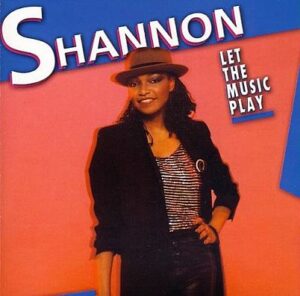
Many of the track’s strong backing vocals were supplied by a well-experienced session singer named Debbe Cole. Cole had previously plied her trade on early, pioneering hip-hop albums such as Deuce (Kurtis Blow), and also influential Freestyle classics like Shannon’s ‘Let the Music Play’. However, she is perhaps best remembered for her classy vocal on Malcolm McClaren’s pop/opera epic, ‘Madam Butterfly’. Interestingly, this memorable top twenty hit was the first major production by an up-and-coming US producer named Stephen Hague, whose next significant project would be Orchestral Manoeuvres In The Dark Crush album (Hague would, of course, later garner acclaim helming records by the likes of New Order, Pet Shop Boys and Dubstar). Debbe also became heavily involved with the promotion of the ‘Liberty’ single, and also the subsequent tour in Brazil, where Kon Kan continued to be extremely popular. Debbe was kind enough to tell The Electricity Club about her work on the album, as well as other projects.
How did you end up working on the Syntonic album?
Debbe Cole: “With Marc Nathan’s search on to assist Barry in finding a vocalist, he contacted New York DJ Johnny Dynell for recommendations [NB: Dynell’s memorable ‘Jam Hot’ single was sampled by Beats International on their Number One hit, ‘Dub Be Good To Me’ in 1990– Ed]. I’d worked with Dynell years before on a show by Gabriel Rotello (‘Downtown Dukes and Divas’) at the Limelight in New York City. Johnny referred me, I showed up at the studio and watched something very cool happen!”
How much did you know about Kon Kan before the Syntonic sessions?
Debbe Cole: “Actually, my familiarity with Kon Kan wasn’t until I went back and listened to previous works. Loved ‘em… just never caught who the artist was!”
Do you have any particular favourite tracks?
Debbe Cole: “’These Boots Are Made For Walking’! We became quite animated on stage with that, and the [other] hits he’d already made. ‘Liberty’ of course -. [it] has a beautiful and deeply sentimental spot in my life. It was one of the songs that my mother loved immediately and requested hearing fairly frequently.”
‘Liberty’ was produced by John Luongo who you’d of course worked with before. Was this someone you particularly enjoyed working with?
Debbe Cole: “John and I spoke just today! There’s such a mutual admiration society between John, myself and [my] brother, Khris Kellow. We’d done a lot of work together (dance related) and we’ve stayed close friends, along our separate journeys.”
Was the video fun to make?
Debbe Cole: “I didn’t lie, per se, when I was asked if I skated… I didn’t bother to say how bad I was! So I was handed a pretty dress that looked like a Marie Antoinette and Vivienne Westwood creation – oh my God I am totally busted! Glad I wasn’t asked if I’d driven a race car!! Absolutely the best time though.”
What was Barry like to work with?
Debbe Cole: “Intimidating at first – he had it *so* together and knew exactly what he needed from me. After not too long, things began to click, and I was extremely proud of this work with Barry. And that comprehension translated well live – we had a ball on stage for sure!”
Were you surprised that Syntonic wasn’t a hit?
Debbe Cole: “At the time, my glow from Barry’s reception on the Brazilian tour took me by such a pleasant surprise [that] I’d never really thought of it as not being a hit. [However, after] returning to the reality of USA radio cynicism and tidy little pockets that everyone must fit into, I was made painfully aware this project wasn’t given its deserving shot.”
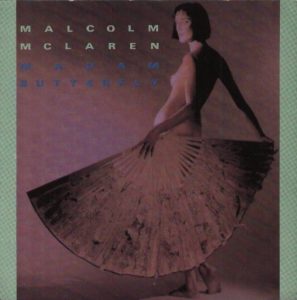
You contributed a memorable vocal to Malcolm McLaren’s incredible single, ‘Madam Butterfly’, which was produced by Stephen Hague – what was it like working with both McLaren and Hague?
Debbe Cole: “I loved working with him and Walter [Turbitt]. They knew exactly how to rein in Malcolm’s ‘organised rambling’ and make powerful sense of it! I’d previously worked with Malcolm in New York on ‘Eiffel Tower’ and he phoned me way after that to do the title track in Boston… still not fully aware of his fame or past endeavours. We all worked very hard to get it just right: Him explaining this young girl’s pregnant plight with a sailor (well worth all the hours tweaking my understanding of her character) and to observe his process being kind of translated by Stephen. Cio Cio San: my first shot at acting – thanks Mac!”
You’ve also featured on numerous Latin freestyle recordings (Shannon, Lisa Lisa and Cult Jam, Marc Anthony etc). Was this a genre of music that you were particularly fond of?
Debbe Cole: “I am, to this day, a fanatical freestyle female! [I’m] losing track of how many Latin hip-hop/freestyle songs I’ve sung on and been ‘ghost lead’ to. I was simply working my ass off, allowing the producers to feed me the old “just put a reference lead vocal down for the artist to hear” and winding up hearing my frickin’ voice on the radio, mixed higher than the horrid attempt at singing tucked underneath by the so-called artist! A good weave and some tits… forget it if these girls could sing or not (mostly not!)! Getting money of course meant a lot to me, but the rush of being known and respected in that community balanced out getting duped somehow. Throughout it all [I] made many friends that remained in my life. It gave me and my spirit lots of fierce memories and tons of lessons learnt.”
The Electricity Club gives its warmest thanks to Barry Harris, Marc Nathan and Debbe Cole
https://www.facebook.com/konkanofficial/
www.discogs.com/artist/Kon+Kan
Text and Interviews by Barry Page
- QUEEN’S MACHINES – How Music Changes Through The Years (1979 – 1984) - July 25, 2021
- SUGAR RUSH – The Story of ‘Sugar Tax’ - May 7, 2021
- Survival – The Story Of ‘Machine and Soul’ - April 30, 2021



